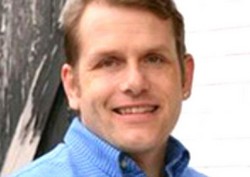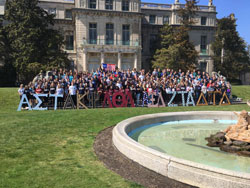The Criminal Justice, Political Science, and School of Social Work Departments are co-sponsoring a guest speaker named David Garlock, a former prisoner and re-integrating citizen, on Oct. 11 in Wilson Hall.
Garlock was convicted of murder alongside his brother back in 1999 in Alabama for 25 years. Garlock and his brother were repeatedly sexually and physically assaulted for eight years by the same offender. When the two were left felt feeling as if they had no other option, they murdered the person who caused each of them so much pain.
However, over the course of his 13 years spent in prison, he was able to use this hurt to educate and better himself in order to become the man he is today. With the help of lawyer and founder of the Equal Justice Initiative (EJI), Bryan Stevenson, he and his brother’s sentences were reduced, and he was able to fully contribute and engage in his passion in life.
The Equal Justice Initiative was founded by Stevenson in Montgomery, AL to aid the “poor, incarcerated, and the condemned” find justice. Since its inception in 1989, Stevenson and his team have even exonerated 135 people from death row sentences.
Stevenson and his work with EJI are going to be the subject of the 2020 Warner Bros. film Just Mercy, based on Stevenson’s New York Times best-selling book. The film will star Jamie Foxx, Brie Larson, and Michael B. Jordan as Stevenson.
Nicholas Sewitch, J.D., Criminal Justice Chair and professor, said, “As good as our system is, it’s not perfect. (Prisoner) re-entry is very difficult for someone to go through. There are plenty of obstacles with parole, probation, and normal things that become much harder when you’re convicted, especially when it’s a serious charge, like David’s.”
The Criminal Justice Department requires students to take course on corrections that focus on community and institutional elements. Sewitch said, “We introduce students to the practitioners of law and order, but we should also show them the people they are choosing to protect: the victims and what would be the criminal.”
Eleanor Novek, Ph.D., professor of communication, teaches a course on ethics within New Jersey State Prison alongside Johanna Foster, Ph.D., associate professor of political science. Novek said, “Our vision is to provide college classes in any way that we could. The second part is we recognize the value to university students of having that kind of experience of studying with incarcerated people. Someone could be capable of committing a crime in one point of their life, and change, develop and grow so they’re not the same person they used to be.”
According to Alexi Jones of PrisonPolicy.org, 6.7 million people in the U.S. are under “correctional control,” which is defined as either incarceration, probation, or parole. “For perspective, if the population under correctional control were its own state, it would be the 16th largest in the nation, comparable to the size of Massachusetts or Tennessee,” writes Jones.
Involved in many organizations that centralize their focus around criminal justice reform, Garlock’s main focus is helping others become more than a statistic. Supporting the idea that knowledge is power, by also defining the means of ‘power’ all at the same time. Not long after Garlock was released, he further pursued education and eventually earned a Bachelor’s Degree in Urban Studies focusing on Criminal Justice and Social Welfare from Eastern University in 2017.
Now, Garlock currently helps sex-offenders and other re-integrating citizens, as a Lancaster Program Director for New Prison Ministries, whom are trying to re-enter society and go on to live a better and healthier life.
Novek said, “From an ethics perspective, human beings, even when they harm each other, are still somebody’s father, son, mother, sister, and pat of our human family. And they have human rights.”
The event will be at 10 a.m. in the Wilson Auditorium and again at 1:15 p.m. on Oct. 11.
PHOTO COURTESY of Nicholas Sewitch



